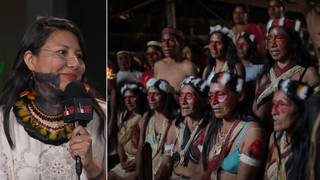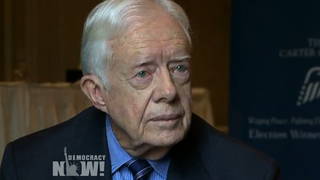
Topics
Guests
- Sharif Abdel Kouddousindependent journalist and Democracy Now! correspondent based in Cairo, Egypt. His report from Egypt was made possible in part by the Pulitzer Center on Crisis Reporting.
Mass protests across Egypt have entered a third day, calling on the country’s military rulers to quickly transfer power to a civilian government. The fiercest clashes are taking place in Cairo’s Tahrir Square, where thousands of protesters have battled with security forces since Saturday morning. The Associated Press reports today Egypt’s Ministry of Health has raised its casualty figures to 35 dead and more than 1,750 wounded. “Our demands at the beginning of the revolution were freedom, dignity and social justice. We have not seen social justice,” says Nasser Abdul Hadi, one of the protesters interviewed in a video report by Democracy Now! correspondent Sharif Abdel Kouddous, who is on the ground in Cairo and has covered the protests since they began. Special thanks to Jacquie Soohen of Big Noise Films, and to Cressida Trew for additional footage. [includes rush transcript]
Transcript
AMY GOODMAN: Mass protests in Egypt have entered a third day in cities across the country calling for the country’s military rulers to quickly transfer power to a civilian government, the fiercest clashes taking place in Cairo’s Tahrir Square, where thousands of protesters have been battling with security forces continuously since Saturday morning.
Democracy Now! correspondent Sharif Abdel Kouddous is on the ground in Cairo. He’s been covering the protests since they began. He files this report.
SHARIF ABDEL KOUDDOUS: Ten months after the Egyptian revolution began, Tahrir Square is once again the epicenter of a new uprising in Egypt. Thousands of people have taken to the streets to protest the Supreme Council of Armed Forces that came to power after the fall of Hosni Mubarak. For close to 40 straight hours, protesters clashed with security forces in downtown Cairo in some of the fiercest street battles since the revolution began. Protests have spread to Alexandria, Suez and several other big cities. At least 12 people have been killed, according to the Ministry of Health, and more than 1,400 injured, in what has become a mass stand against military rule.
The new uprising began in the wake of a massive protest on November 18th, originally called for by Islamist groups but attended by tens of thousands of men, women and children from across the political spectrum. The protest was staged 10 days before parliamentary elections are scheduled to take place. Thousands gathered in Tahrir on Friday to demonstrate against the military council’s rule and its recent moves to control the writing of the constitution and entrench its grip on power. While most left the square by nightfall, a few hundred stayed the night for an open-ended sit-in. But early the next morning, Central Security Forces stormed Tahrir and violently dispersed those who had set up camp. It wasn’t long before hundreds of protesters descended on Tahrir in solidarity. Clashes with police quickly escalated. Protesters threw rocks while security forces used rubber bullets and a seemingly endless supply of tear gas on the crowds.
This is Shady Mohammed, a high school teacher.
SHADY MOHAMMED: [translated] This gas burns the face. It feels like there is poison in your mouth, and it affects your nervous system. They’ve been firing it since 2:00 p.m. until now, about 24 hours nonstop. We go forward, then retreat. We don’t know what they want. I was standing in the middle of the clashes. I got hit in the head with a rock and took three stitches. I’m still here, and I will stay here until we reach some kind of solution.
SHARIF ABDEL KOUDDOUS: The street clashes continued unabated through Saturday night and into the next day. Many hundreds were wounded. Many were overcome by tear gas and collapsed. Many were hit directly in the face with rubber bullets. Malek Mostafa, a well-known activist, was blinded in his right eye, as were numerous others. Protesters set up field hospitals in and around the square. Mohamed Abdullah is a volunteer physician.
MOHAMED ABDULLAH: Listen, the police here is so stupid. They have no sense. They’re killing people. They shoot guns. They was targeting on me. Not around them shoot gun, they’re targeting on people. They’re targeting the bomb, the gas bombs. They don’t throw it randomly, OK? They throw in the mosque, they throw in the hospital. When they get into the square, they throw on us. They have no mind, OK? That’s all. I was there right in front of the police, OK, and bringing some patient to the clinic. They shot gas bombs. And then I was like—no barrier between us, OK? They shot me and shoot gun. I got six—six pills, six balls on my head, and two balls here, and four balls here, OK?
SHARIF ABDEL KOUDDOUS: These were pellets?
MOHAMED ABDULLAH: Balls, small balls. OK?
SHARIF ABDEL KOUDDOUS: They’re very close to your eye.
MOHAMED ABDULLAH: This is forbidden. It’s forbidden. OK? And gases. And they use stones and shoot gun and gas. OK? And—
SHARIF ABDEL KOUDDOUS: And can you describe the effect of the gas on people?
MOHAMED ABDULLAH: The gas make people dizzy, and can’t take his breath, and like vomiting. OK? Can’t open his eyes, tears and saliva. It like destroys the people like five minutes. They can’t—they have no control. OK? They can’t run. They can’t move. Some people get into coma.
SHARIF ABDEL KOUDDOUS: Chants against the Supreme Council of Armed Forces and Field Marshal Hussein Tantawi, the de facto ruler of the country, filled the square. Protesters said they would not leave until they saw change.
NASSER ABDUL HADI: [translated] My name is Nasser Abdul Hadi. I am here because we don’t feel like we had a revolution at all. Our demands at the beginning of the revolution were freedom, dignity and social justice. We have not seen social justice. We had a regime that looked like this building here. The building is 10 stories. We got rid of two stories, but there are eight stories to go that we can’t get rid of. They’re built in tight. They’re the ones ruining the country, left and right.
SHARIF ABDEL KOUDDOUS: Mustafa Sadeq is a 17-year-old protester who took part in the revolution on January 25th and was one of the thousands of young men who had flooded Tahrir once again.
MUSTAFA SADEQ: I came here yesterday at night, because I was going—I was at TEDxYouth@Cairo. And then I heard about what’s happening, so I came directly. I went home, then I waited for my parents, so they can come. And they approved, and they came with me. And the three of us went, came here. We met lots of people who were very injured—our friends, our families, who were injured. And I went to the front lines. I checked what’s happening. People—it was awful. The CS gas is horrible. It’s uglier than ever. It’s the worst, yeah.
SHARIF ABDEL KOUDDOUS: What other kinds of weapons are they using?
MUSTAFA SADEQ: They’re using the rubber bullets and the other kind of bullets that, like, flashes in the air and stuff. And yeah, it hurts lots of people, like, you know, Malek Mostafa, the activist. He lost his eye. Several other people lost their eyes. And actually, the revolutionary people who were injured in Jan. 25, they also got injured, like there was one guy who had lost his eye, and he lost his other eye yesterday. So he had both his eyes lost. It’s important for anyone to be here, because it’s not a matter of “Yay, we’re fighting the cops!” and stuff. It’s a matter of rebuilding the country from point zero, to start clean. And you have this grain of blackness, of evil, that’s still here, so we have to eliminate it. So, everyone should be here.
SHARIF ABDEL KOUDDOUS: By Sunday afternoon, the clashes showed no signs of abating. At around 5:30 p.m., the police and the army launched a coordinated and brutal attack to take back the square. They stormed forward with police vehicles and large volleys of tear gas. The sound of gunfire filled the air. The protesters were forced back into side streets. Bodies were left lying on the ground. In disturbing footage, a motionless body was dragged by security forces a few yards to the side of the street and left amongst a pile of garbage. Other bodies lay motionless on the nearby sidewalk. After the police and army inexplicably retreated, protesters defiantly moved back into the square. Their tents had been set on fire. At the field hospital, a chaotic scene unfolded, with the dead and wounded being carried in in droves, many of them young boys. By nightfall, thousands had filled the square again with loud chants against the military council. Ambulances waded through the crowd, ferrying the wounded to nearby hospitals. The outcome of the clashes remains unclear, but Egypt is witnessing what appears to be a renewed uprising.
For Democracy Now!, I’m Sharif Abdel Kouddous, with Jacquie Soohen, in Cairo, Egypt. Special thanks to Cressida Trew and Pierre Sioufi.
AMY GOODMAN: This update since Sharif’s report came in: the AP reports the Ministry of Health in Egypt has raised its casualty figures to at least 35 dead and more than 1,750 wounded. Sharif’s reporting from Egypt is made possible in part by the Pulitzer Center on Crisis Reporting.












Media Options